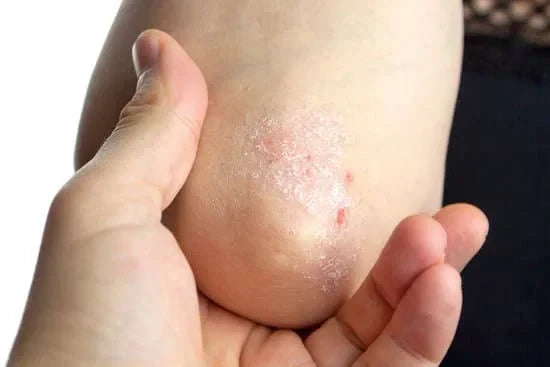




What are you looking for?

Psoriasis winter care made easy. Practical tips to soothe itchy red patches, protect your scalp, and reduce flare-ups in cold, dry weather.
Cold, dry air can make psoriasis feel harsher. Winter care focuses on protecting the skin barrier, calming itch, and avoiding daily triggers. Small, steady steps work better than harsh fixes. A consistent routine supports comfort and reduces irritation during colder months.
Air is drier and skin loses moisture quickly.
Heaters and hot showers strip natural oils.
Less sunlight reduces natural vitamin D exposure.
Stress from holidays and workload can intensify flares.
These factors raise the chance of itchy red patches in those with psoriasis. Cold-weather friction (tight clothes, wool layers) can also worsen scaling.

Cleanse gently with a quick lukewarm shower using a mild, fragrance-free cleanser.
Moisturise within three minutes using a thick cream or ointment with ceramides or petrolatum.
For plaques, apply prescribed ointment first, then moisturiser.
Wear soft, breathable layers and avoid scratchy wool on plaques.
If safe, get brief early sunlight exposure.
Morning hydration helps reinforce the barrier and reduces daytime itching.
Take a 10–15 minute lukewarm bath with bath oil or colloidal oatmeal. Pat dry. Seal with an ointment.
Apply an extra layer of occlusive cream to hands and feet and wear cotton gloves or socks overnight.
Before stepping out, use a thin ointment layer on exposed plaques.

Evening care supports overnight repair when the skin naturally restores moisture.
Oil the scalp 1–2 times a week with lukewarm coconut or olive oil for 20 minutes.
Use a medicated coal tar or salicylic acid shampoo on rotation with a mild shampoo as advised by your doctor.
After oiling, use a soft brush to loosen scales gently. Avoid picking.
Dry with lukewarm air only; avoid hot dryers and harsh styling.
Consistency makes scalp care more effective, especially in winter when flakes worsen.
Use lukewarm water that feels comfortable but never hot. Hot water softens scales temporarily but dehydrates the skin later. After any bath or handwash, moisturise immediately. Keep a travel-size cream with you.
Carry a mini ointment and lip balm.
Drink water consistently as indoor air is drying.
Take short movement or breathing breaks to manage stress.
Wear soft inner layers to avoid friction on plaques.
Plan moisturising breaks during long travel or heated environments.
Eat balanced plates with dal, vegetables, whole grains and healthy fats.
Add omega-3 sources like flaxseed, walnuts or fatty fish.
Limit individual triggers such as high sugar, excess alcohol and very spicy meals.
Use simple breathing practices like Anulom-Vilom or Bhramari.
Keep a stable sleep schedule.
These habits help regulate inflammation and support a calmer skin cycle.
Rapid spread of plaques, persistent cracking or bleeding, signs of infection, severe scalp involvement, thick nails, joint pain or morning stiffness. A clinician can tailor medicine, light therapy or seasonal adjustments. Educational only; not medical advice.
Amiy’s approach focuses on calming skin–nerve interaction (Bio-Neuromodulation™) and using synergistic botanicals (Complex Plant Elixir™) to support comfort and barrier health when paired with regular care. No cure claims; individual results vary.
These internal formulations may help maintain a calmer stress response and support overall skin comfort during flare-prone seasons.
Cystic acne treatment: calm deep, painful pimples safely | Amiy Naturals
Secret to Glowing Skin: Gut Health, Diet & Wedding-Ready Tips | Amiy Naturals
Educational content only; not a substitute for professional medical advice. Consult a qualified healthcare provider for personal care.
Use thick ointments or rich creams without fragrance. Apply on damp skin within minutes of bathing.
They soften scales but worsen dryness. Stick to lukewarm water and short showers.
Use as directed. Many alternate medicated shampoo with a mild one to avoid over-drying.
Diet supports overall comfort but does not replace treatment. Balanced meals and omega-3s may help.
Yes. The immune system speeds up skin turnover, causing thick, scaly plaques. Care focuses on calming inflammation and protecting the barrier.
If winter dryness is making your plaques tight and itchy, pair your doctor’s plan with gentle, natural support. Explore our skin care collection for barrier-friendly options that support daily comfort. For acne-prone winter skin, see Acne SOS for targeted support alongside your routine.
